Caffeine is a natural stimulant found in coffee beans, tea leaves, cocoa beans, and some other plants. It is frequently added to a variety of items, such as energy drinks and some pharmaceuticals, and consumed in drinks like coffee and tea. Caffeine is one of the most popular psychoactive chemicals in the world, and it can momentarily improve alertness and decrease feelings of exhaustion. However, overindulgence may result in adverse effects like anxiety, sleeplessness, and elevated heart rate. Here is a thorough article on caffeine!
How does Caffeine Work in the Body?
The main mechanisms by which caffeine exerts its stimulatory action appear to be the blocking of adenosine receptors and inhibition of phosphodiesterases.
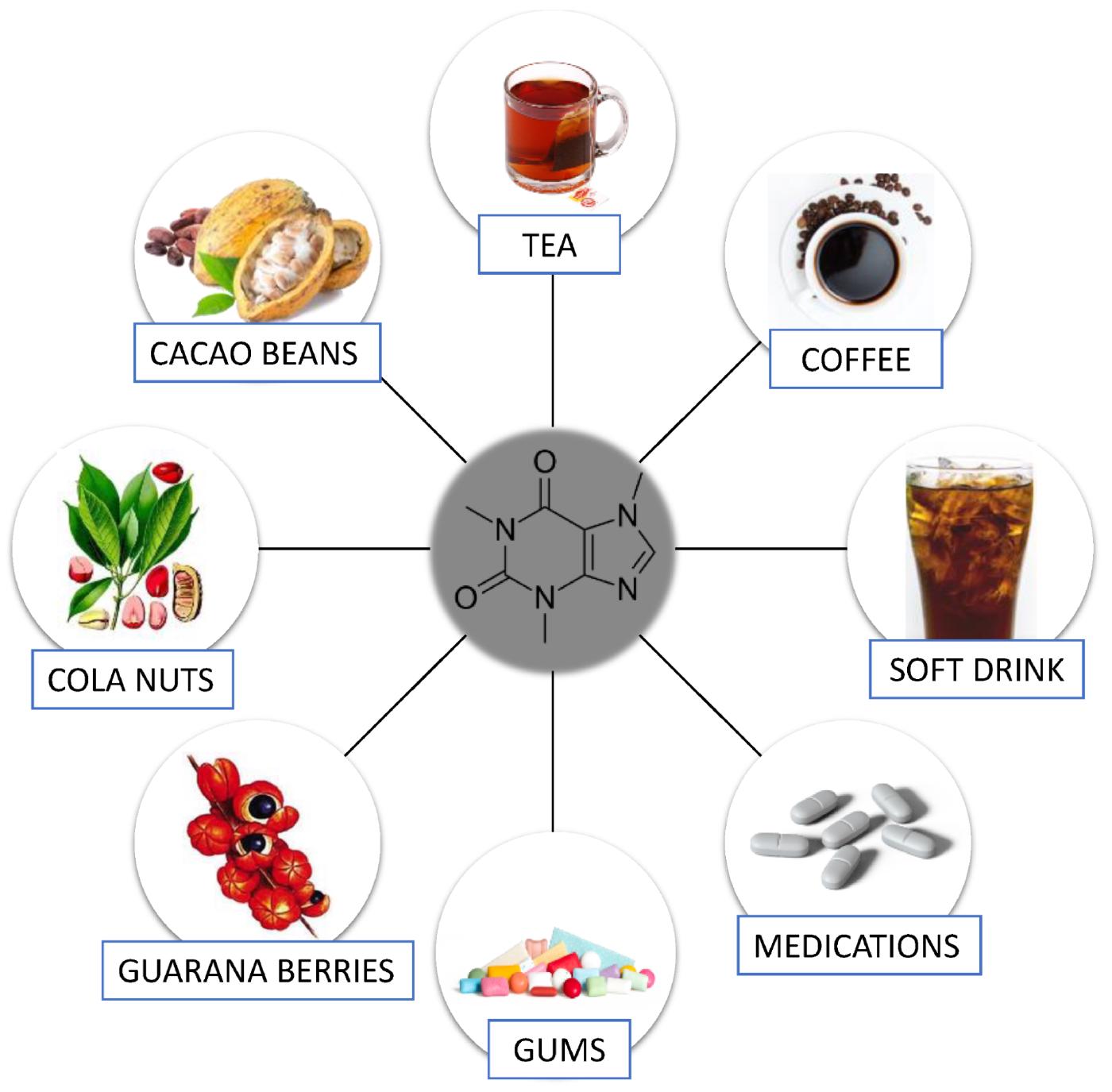
- Adenosine Receptor Blockade: Adenosine is a neurotransmitter that helps people unwind and sleep. It creates relaxation. In order to function, caffeine blocks the brain’s adenosine receptors. Being unable for adenosine to attach to its receptors makes you feel more awake and less sleepy.
- Enhanced Release of Neurotransmitters: Dopamine and norepinephrine are two examples of the neurotransmitters that caffeine enhances the release of. A body’s “fight or flight” reaction is triggered by norepinephrine, whereas dopamine is linked to reward and pleasure. Elevations in these neurotransmitter levels have the potential to enhance mood, concentration, and focus.
- Improved Cognitive Function: Caffeine can enhance cognitive functions such as memory, attention, and problem-solving. It may facilitate clearer thinking and speedier decision-making.
- Increased Wakefulness: Caffeine helps you stay awake and aware even when you’re sleepy by inhibiting adenosine and increasing other neurotransmitters.
- Temporary Energy Boost: The hormone adrenaline, which primes the body for physical activity, can be released in response to caffeine. Feelings of enhanced energy and alertness may result from this.
- Elevated Blood Pressure and Heart Rate: Adrenaline is released when caffeine is stimulated, and this can raise your blood pressure and heart rate. This explains why ingesting coffee may make you feel more “energetic.”
- Diuretic Effect: Due to its modest diuretic properties, caffeine may cause an increase in the production of urine and consequent fluid loss from the body.
- Tolerance and Withdrawal: Consistent caffeine use might cause your body to become less sensitive to its effects. This implies that in order to feel the same level of alertness, you might require more caffeine. You may suffer from headaches, irritability, and weariness if you abruptly cut back on or quit drinking caffeine.
The Health Effects of Caffeine
There are many benefits that come with ingesting caffeine.
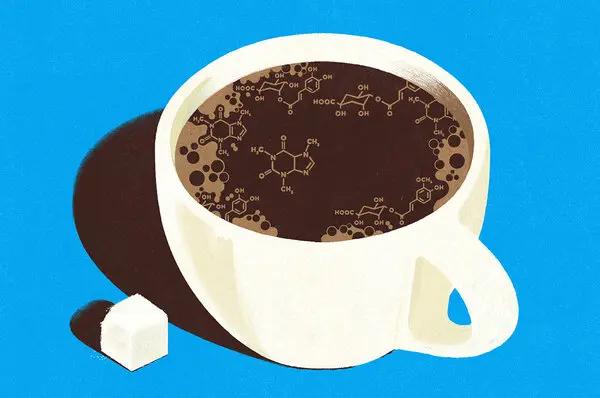
- Enhanced Alertness: As a stimulant, caffeine helps enhance mental focus and alertness, which makes it simpler to remain awake and attentive.
- Boosts Physical Performance: By raising adrenaline levels, caffeine can increase physical performance by enhancing strength and endurance during exercise.
- Mood Enhancement: Due to its impact on neurotransmitters like dopamine and serotonin, caffeine has been shown by some researchers to both elevate mood and lower the risk of depression.
- Reduced Risk of Certain Diseases: According to specific research, a moderate intake of caffeine may help reduce the chance of developing certain illnesses, including Alzheimer’s and Parkinson’s.
- Antioxidant Properties: The antioxidant characteristics of caffeine may aid in shielding cells from damage caused by free radicals.
Along with benefits, there are also disadvantages and risks.
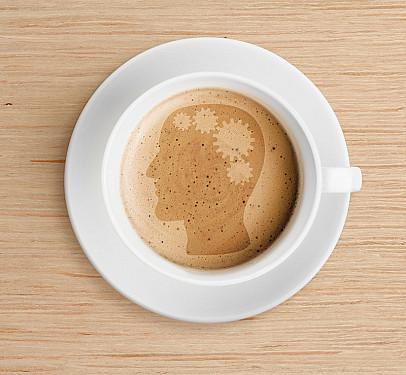
- Sleep Disruption: If caffeine is ingested too close to bedtime, it can disrupt sleep and cause insomnia or poor quality sleep.
- Increased Heart Rate and Blood Pressure: For people with cardiac problems, caffeine may cause transient increases in blood pressure and heart rate.
- Dependency and Withdrawal: Regular coffee intake can cause reliance, and stopping suddenly can cause withdrawal symptoms like headaches, exhaustion, and irritability.
- Digestive Issues: Caffeine consumption may cause gastrointestinal distress in certain people, such as upset stomach and acid reflux.
- Anxiety and Jitters: Excessive coffee intake can cause jitters, anxiety, and nervousness in certain people.
- Bone Health: Excessive caffeine intake may interfere with calcium absorption, which could have an effect on bone health.
- Pregnancy Concerns: Studies have linked high caffeine use to an increased risk of pregnancy-related problems, such as preterm birth and low birth weight.
Caffeine in Different Beverages
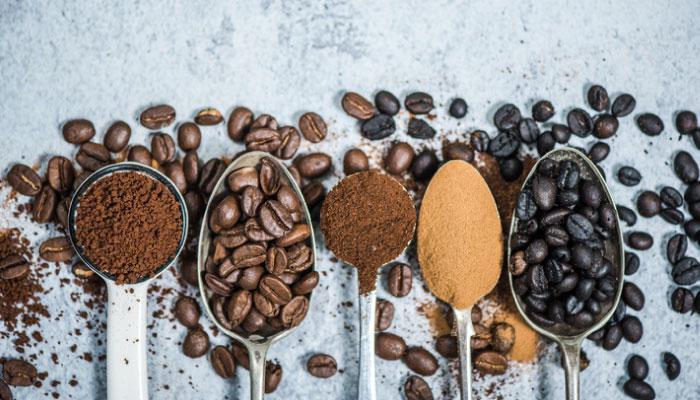
Coffee: Coffee is known for its relatively high caffeine content. A typical 8-ounce (240-milliliter) cup of brewed coffee contains around 95 milligrams of caffeine. However, this might differ greatly based on the type of coffee bean and brewing technique.
Espresso: Espresso is concentrated coffee. A 1-ounce (30-milliliter) shot of espresso contains about 63 milligrams of caffeine.
Tea: All types of tea, including black, green, white, and oolong, include caffeine, though usually in smaller doses than coffee. Approximately 30 to 50 mg of caffeine are included in an 8-ounce (240 milliliter) cup of black tea. Green tea typically has 20–45 mg of caffeine per 8-ounce cup, which is a little less than black tea.
Soft Drinks: Caffeine is a common ingredient in soft drinks, particularly cola drinks. There are around 30–40 mg of caffeine in a typical 12-ounce (355 milliliter) can of cola. Certain energy drinks frequently contain more than 100 mg of caffeine per serving, which is far higher than average.
Energy Drinks: Energy drinks are made with caffeine as its main ingredient. Energy drinks can range greatly in their caffeine level. In an 8-ounce (240 milliliter) portion, some can have anywhere from 100 to 200 mg of caffeine.
Iced Tea: The preparation and type of tea used might affect the flavor of iced tea. There could be between 20 and 50 mg of caffeine in a 12-ounce (355 milliliter) glass of iced tea.
Hot Chocolate: Hot chocolate is typically low in caffeine. A 12-ounce (355-milliliter) cup of hot chocolate contains very little caffeine, usually less than 10 milligrams, if any.
Decaffeinated Beverages: The amount of caffeine in decaffeinated tea and coffee is substantially lower. While decaffeinated tea may include between 2 and 10 mg of caffeine per 8-ounce cup, decaffeinated coffee typically has between 2 and 5 milligrams.

It is crucial to remember that these are only estimates, and that the amount of caffeine in them might change according to the brand, how it is prepared, and how much is served. Because everyone has a different tolerance to caffeine, what one person considers to be a moderate or excessive amount may not be the same for another. When in doubt, always read product labels and ask about caffeine content if you have any special dietary requirements or concerns.
Is Caffeine Consumption Safe during Pregnancy?

Moderate Consumption: Most health organizations, including the American College of Obstetricians and Gynecologists (ACOG) and the World Health Organization (WHO), suggest that pregnant women can safely consume moderate amounts of caffeine, typically up to 200-300 milligrams (mg) per day. This is roughly equivalent to one 12-ounce cup of coffee or two cups of tea.
Individual Sensitivity: It’s important to remember that individual sensitivity to caffeine can vary. Some pregnant women may be more sensitive to caffeine’s effects, so they should monitor their own reactions and adjust their caffeine intake accordingly.
Potential Risks: There is a link between high caffeine consumption during pregnancy and a higher risk of miscarriage, premature birth, and low birth weight. To establish conclusive links, more research is necessary as the evidence addressing these dangers is inconsistent. A stimulant, caffeine can raise blood pressure and heart rate. An excessive amount of caffeine may have an impact on the cardiovascular system of the growing fetus. Caffeine can pass through the placenta and get to the unborn child. Because of the potential for the fetus to have restricted caffeine metabolism, excessive caffeine use should be avoided.
Sources of Caffeine: In addition to coffee, tea, soft drinks, energy drinks, chocolate, and several over-the-counter drugs also contain caffeine. When estimating your daily intake of caffeine, it’s critical to take into account all of your sources.
Decaffeinated Options: If you’re worried about consuming caffeine while expecting, think considering making the move to decaffeinated herbal teas or coffee.
Consult with a Healthcare Provider: It’s essential to discuss your caffeine consumption with your healthcare provider. They can provide personalized advice based on your specific health and pregnancy circumstances.
In conclusion, most pregnant women can safely consume moderate amounts of caffeine, but it’s important to monitor your intake and speak with your healthcare professional. It may be recommended that pregnant women who have a history of pregnancy difficulties or who have underlying medical disorders exercise extra caution when it comes to caffeine use. Prioritizing a healthy lifestyle and eating a well-balanced diet is always a good choice when pregnant, as it supports the developing baby’s health as well as the mother’s.
True or False?
Myth: Caffeine dehydrates you.

- Fact: Although caffeine has a slight diuretic effect, the fluid intake from moderately caffeinated beverages usually offsets the fluid loss from those drinks. If taken in excess, it doesn’t significantly contribute to dehydration.
Myth: Caffeine can sober you up.
- Fact: While caffeine can increase alertness and wakefulness, it has no positive benefits on sobriety or lessens the effects of alcohol. Caffeine and alcohol together can be harmful since they can conceal feelings of intoxication and encourage risky conduct.
Myth: Caffeine is as highly addictive as drugs.
- Fact: Compared to substances like opioids or nicotine, caffeine is less addictive, however it can still cause physical dependence in certain people. The majority of withdrawal symptoms are moderate and transient, such weariness and headaches.
Myth: Caffeine stunts growth in children.
- Fact: There’s no scientific evidence to support the idea that moderate caffeine consumption, such as that found in most beverages, affects a child’s growth.
Myth: Caffeine causes heart problems.
- Fact: Moderate caffeine consumption is generally not linked to an increased risk of heart issues. However, because caffeine can momentarily increase blood pressure and heart rate, people with specific heart issues should speak with their doctor before consuming coffee.
Myth: Caffeine is only found in coffee.
- Fact: Caffeine is present in various foods and beverages, not just coffee. It’s also found in tea, soft drinks, energy drinks, and chocolate, among others.
Myth: Caffeine is bad for your brain.
- Fact: While moderate caffeine consumption is not intrinsically detrimental to the brain, excessive caffeine consumption can cause jitters and anxiety. Actually, it might enhance cognitive abilities including focus and alertness.
Myth: Caffeine is only for wakefulness.
- Fact: Caffeine can have a range of effects, including increased alertness, enhanced physical performance, and improved mood. It’s not solely a wakefulness-promoting substance.
Myth: Caffeine has no health benefits.
- Fact: According to some research, consuming modest amounts of caffeine may offer health benefits, such as a decreased chance of developing some diseases, such as Alzheimer’s and Parkinson’s. Antioxidants are also present, which may be advantageous.
Caffeine Sensitivity

- Genetics: A person’s specific caffeine metabolism may be influenced by genetic factors. While some people can metabolize caffeine more effectively than others, some people have genetic differences that make them more sensitive to the stimulant.
- Enzyme Activity: The amount of the CYP1A2 enzyme, which breaks down caffeine in the liver, varies from person to person. Higher enzyme activity can cause a person to absorb caffeine faster and be less sensitive.
- Tolerance: Consistent caffeine use might cause the body to become less sensitive to the stimulant effects of caffeine. Over time, this may cause those who drink coffee frequently to become less sensitive to its effects.
- Age: As people age, their sensitivity to caffeine may alter. While older adults may experience lower sensitivity, children and teenagers are typically more sensitive to its impacts.
- Health Issues: The way the body reacts to caffeine might be impacted by certain medical issues. People with anxiety problems, for instance, can be more vulnerable to the jitters and anxiety that coffee causes.
- Drug interactions: Caffeine and certain drugs can have opposite effects on one another. If you are taking medicine, it is vital to be aware of any interactions.
- Body Weight and Composition: Since caffeine is absorbed by the body in different ways, people who are heavier or thinner may be more or less sensitive. Smaller people could experience the consequences more acutely.
- Habitual Consumption: Regular coffee drinkers frequently develop tolerance, which makes them require higher doses of the stimulant to get the same effects. This can lessen sensitivity.
It’s critical to pay attention to how caffeine affects you specifically and to your body’s signals. It’s best to cut back on your coffee consumption if you discover that it makes you nervous, interferes with your sleep, or causes other discomforts. However, there’s no reason to worry if you can handle caffeine properly and take advantage of its advantages sparingly.
Heart Health
Caffeine has many benefits for the heart.

- Moderate Consumption: Most individuals consider moderate caffeine consumption to be harmless, and it may even have some cardiovascular advantages. It may lessen the chance of developing some heart conditions and enhance blood flow.
- Antioxidant Properties: The antioxidants in caffeine can help shield cells, especially cardiac cells, from harm brought on by free radicals.
- Decreased Risk of Specific Heart Conditions: Research indicates that moderate coffee intake may be linked to a decreased risk of heart diseases such as stroke and coronary artery disease.
However, there are also many negative aspects of caffeine for the heart.
- Blood Pressure: Caffeine, particularly in those who are sensitive, may momentarily elevate blood pressure. Those who currently have cardiac issues or hypertension may experience this effect more strongly.
- Arrhythmias: In certain people, high coffee dosages can cause arrhythmias, or abnormal heart rhythms. When caffeine is consumed in excess, this is more likely to happen.
- Insomnia: Since sleep is essential for overall cardiovascular health, poor sleep quality brought on by caffeine consumption may have an indirect impact on heart health.
- Anxiety and Stress: Drinking too much coffee can make you anxious and stressed out, which can affect your heart health indirectly by raising stress chemicals like cortisol.
- Drug Interactions: Certain drugs, such as those for cardiac disorders, may interact with caffeine. It’s critical to understand possible drug interactions.
- Individual Sensitivity: Caffeine’s stimulant effects, which can cause palpitations and an elevated heart rate, can affect some people more than others. Some people may find this unsettling or unsettling.
It’s critical to stress that everyone reacts to caffeine differently. For some people, consuming a safe and moderate amount of caffeine could be excessive. Think about the following if caffeine worries you about how it affects your heart:
- Understand Your Tolerance: Keep an eye on how caffeine impacts your blood pressure, heart rate, and general health. Adapt your intake appropriately.
- Speak with a Medical Professional: Consult your healthcare physician if you have any pre-existing heart issues or concerns regarding caffeine. Personalized recommendations depending on your health situation can be given by them.
- Modesty Is Essential: Moderate caffeine use is generally considered to be safe for heart health, with daily intake up to 400 mg, or about 4 cups of coffee.
- Remain Hydrated: If you take coffee, make sure you drink plenty of water because dehydration might aggravate heart-related problems.
In the end, there are a variety of individual variations in the intricate link between coffee use and heart health. Moderation and self-awareness are essential when it comes to caffeine consumption and its impact on your cardiovascular well-being.
The Impact of Late-Night Consumption

Late-night caffeine consumption can lead to delayed sleep onset. Caffeine is a stimulant that can make it harder to fall asleep and boost alertness. Caffeine use prior to bedtime can prolong the amount of time it takes you to fall asleep. Even if you are able to fall asleep after drinking coffee, the length of your sleep will probably be shorter. This implies that you won’t obtain the necessary amount of restorative sleep. Coffee use may increase the frequency of nighttime awakenings. It’s possible that you’ll experience repeated awakenings, which will cause your sleep to be interrupted. Moreover, caffeine has the potential to cause shallower sleep, keeping you from going through the deep, healing phases of the sleep cycle. You can feel less rested when you wake up as a consequence. In addition, coffee has the potential to decrease REM sleep, which is necessary for memory consolidation and brain development. Drinking coffee late at night might tamper with your body’s natural clock, making it more difficult to go to sleep at your preferred hour in the future. Because caffeine sensitivity varies, some people may be more susceptible to the drug’s effects on sleep than others.

To minimize the impact of caffeine on your sleep, you should aim to finish all caffeine-containing beverages or foods several hours before bedtime. The exact timing can vary depending on your sensitivity, but generally, it’s best to avoid caffeine at least 4-6 hours before sleep. Also, keep an eye out for any hidden caffeine sources in prescription drugs, energy drinks, and some teas. Examine product labels to determine possible caffeine sources. It is important to establish a relaxing evening routine to let your body know when it’s time to go to sleep. Before going to bed, stay away from demanding activities, bright screens, and stressful tasks. In addition, observe how your body responds to coffee and modify your intake accordingly. If you experience difficulty falling asleep, you might want to cut back on or give up caffeine in the evening. Finally, to avoid the stimulating effects of caffeine in the evening, go for decaffeinated or caffeine-free beverages.
Alternatives to Caffeine

A good alternative to caffeine is staying hydrated. Dehydration can lead to fatigue, so be sure to drink enough water throughout the day. Even mild dehydration can sap your energy levels. Not only that, but it’s important to have a balanced diet. Foods high in nutrients provide your body the energy it needs. Make an effort to eat a balanced diet rich in whole grains, lean meats, fruits, vegetables, and healthy fats. To maintain stable blood sugar levels and avoid energy dips, try eating smaller, more frequent meals and snacks throughout the day as opposed to three large ones. Regular exercise is a good alternative as well. Through improved oxygen delivery to cells, increased blood flow, and endorphin release, physical activity can raise your energy levels. Make an effort to fit regular exercise into your schedule. And of course, quality sleep is essential for maintaining energy levels. Aim for 7-9 hours of restful sleep per night to recharge your body and mind.

Many people consume caffeine to reduce stress. To lower stress and boost energy, try stress-reduction methods including progressive muscle relaxation, yoga, meditation, and deep breathing. If you’re experiencing daytime fatigue, take quick breaks to stretch, go for a stroll, or engage in relaxation exercises. This can aid in mental and physical renewal. You could also take a power nap. A 20–30 minute snooze might provide you a sudden energy boost without keeping you up at night.
During the day, exposure to natural light can help you feel more energetic and balance your circadian cycle. If there is little natural light, go outside, open the curtains, or think about using a light therapy bulb. Certain herbal teas, like those containing ginseng, ginger, and peppermint, are well-known for increasing energy levels. They can offer a calming pick-me-up and are free of caffeine. Similarly, certain scents such as rosemary, peppermint, and citrus might help with focus and vitality. To help you feel more energized, use candles or essential oils scented with these notes. Furthermore, using deep breathing techniques will raise your body’s oxygen levels, which will make you feel more alert and energized. On a completely different note, you can stay connected with your family and friends. Having conversations with loved ones might make you feel more energized. Isolation can exacerbate feelings of fatigue. Last but not least, being organized and having a clear plan for your day can reduce mental fatigue and increase productivity.
Keep in mind that every person has different energy requirements and reactions to these tactics, so you might need to try a few different combinations before you find the ones that work best for you. Additionally, you should seek the advice and correct evaluation of a healthcare professional if you suffer from persistent fatigue or suspect that you may have an underlying medical ailment.
Chemistry of Caffeine
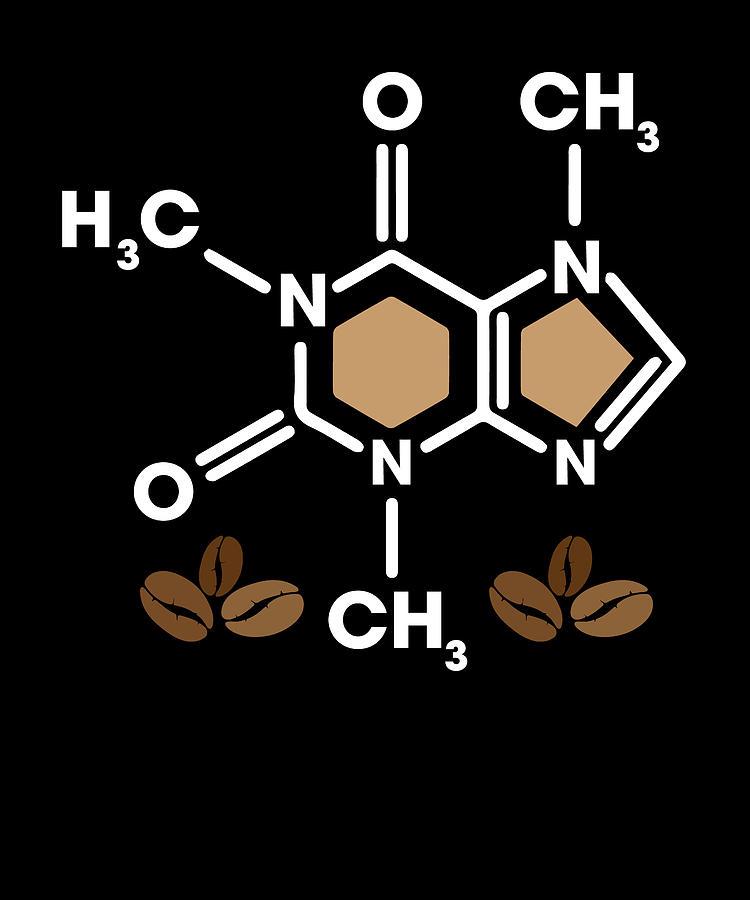
Caffeine is a natural stimulant that belongs to a class of compounds known as xanthines. Its chemical makeup consists of carbon (C), hydrogen (H), nitrogen (N), and oxygen (O) atoms. The molecular formula for caffeine is C8H10N4O2.
Here’s a breakdown of the chemical structure of caffeine:
- Carbon (C): 8 atoms
- Hydrogen (H): 10 atoms
- Nitrogen (N): 4 atoms
- Oxygen (O): 2 atoms
To go into more depths, here is more information about the organic chemistry of caffeine:
- Xanthine Core: The xanthine core, a bicyclic structure made up of two fused rings—a five-membered ring known as an imidazole and a six-membered ring known as a pyrimidine—is the structural core of caffeine. The stimulating qualities of caffeine are caused by these rings.
- Methyl Groups (CH3): In the structure of caffeine, three methyl groups (CH3) are joined to nitrogen atoms. Some of the pharmacological actions of the molecule can be attributed to these methyl groups. They make caffeine more lipid soluble, which facilitates its easier passage through the blood-brain barrier.
- Amine Groups (NH2): Caffeine has two amine groups (NH2) bonded to nitrogen atoms. The fundamental (alkaline) qualities of caffeine are influenced by these amine groups.
- Carbonyl Groups (C=O): Oxygen atoms double-bonded to carbon atoms are what give caffeine its carbonyl grouping. These groups are present in the imidazole and pyrimidine rings.
- Oxygen (O) Atoms: Caffeine has a number of oxygen (O) atoms, including those in the carbonyl groups and those in the hydroxyl (OH) groups that are joined to carbon atoms.
Because of its molecular makeup, caffeine can interact with a wide range of enzymes and receptors throughout the body, including the brain’s adenosine receptors. When adenosine attaches to its receptors, it is a neurotransmitter that encourages relaxation and drowsiness. Because caffeine and adenosine share a structural similarity, caffeine can bind to these receptors and prevent them from activating. As a result, there is an increase in alertness and a decrease in weariness.
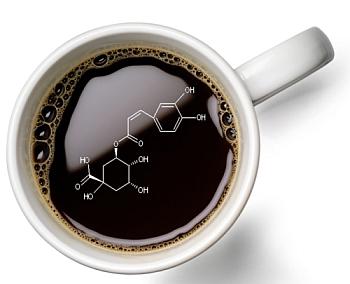
Enzymes such as cytochrome P450 1A2 break down caffeine in the liver to produce a variety of metabolites. Although it varies from person to person, caffeine’s half-life in the body typically lasts between three and five hours.
Naturally occurring in the seeds, leaves, and fruits of many different plants, caffeine is a white, crystalline chemical that is most commonly found in coffee beans, tea leaves, cacao beans (which are used to produce chocolate), and a few other sources. Because of its stimulating properties, it functions as a central nervous system stimulant and is frequently found in tea, coffee, and energy drinks.
